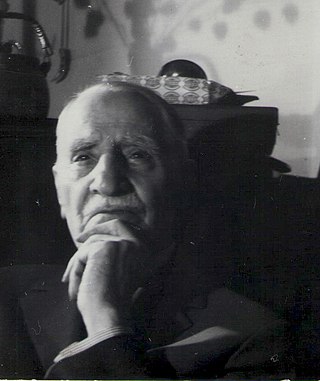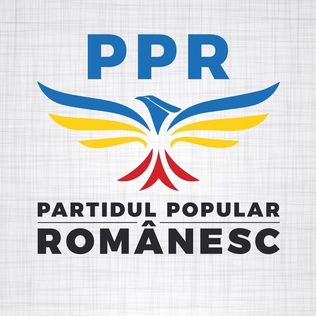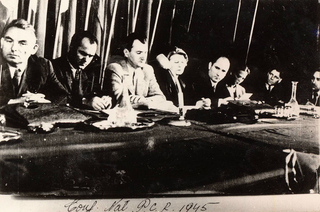| |||||
| Decades: | |||||
|---|---|---|---|---|---|
| See also: | |||||
Events from the year 1921 in Romania. The year saw the formation of the Romanian Communist Party out of the Socialist Party and subsequent imprisonment of the Communist leadership.
| |||||
| Decades: | |||||
|---|---|---|---|---|---|
| See also: | |||||
Events from the year 1921 in Romania. The year saw the formation of the Romanian Communist Party out of the Socialist Party and subsequent imprisonment of the Communist leadership.

Nicolae Rădescu was a Romanian army officer and political figure. He was the last pre-communist rule Prime Minister of Romania, serving from 7 December 1944 to 1 March 1945.

Nicolae Bretan was a Romanian opera composer, baritone, conductor, and music critic.

Iorgu Iordan was a Romanian linguist, philologist, diplomat, journalist, and left-wing agrarian, later communist, politician. The author of works on a large variety of topics, most of them dealing with issues of the Romanian language and Romance languages in general, he was elected a full member of the Romanian Academy in 1945. He was head of its Institute of Linguistics between 1949 and his retirement in 1962.
The Socialist Party of Romania was a Romanian socialist political party, created on December 11, 1918 by members of the Social Democratic Party of Romania (PSDR), after the latter emerged from clandestinity. Through its PSDR legacy, the PS maintained a close connection with the local labor movement and was symbolically linked to the first local socialist group, the Romanian Social-Democratic Workers' Party. Its creation coincided with the establishment of Greater Romania in the wake of World War I; after May 1919, it began a process of fusion with the social democratic groups of in the former territories of Austria-Hungary — the Social Democratic Parties of Transylvania, Banat and Bukovina. The parties adopted a common platform in October 1920. Progressively influenced by Leninism, the PS became divided between a maximalist majority supporting Bolshevik guidelines and a reformist-minded minority: the former affiliated with the Comintern as the Socialist-Communist Party in May 1921, while the minority eventually established a new Romanian Social Democratic Party.

Constantin Vișoianu was a Romanian jurist, diplomat, and politician, who served as Minister of Foreign Affairs at the end of World War II. He later emigrated to the United States, where he served as President of the Romanian National Committee.
Parliamentary elections were held in Romania on 17 March 1985. The Front of Socialist Unity and Democracy (FDUS), dominated by the Romanian Communist Party (PCR) and including other mass organisations, was the only group to contest the elections, and no prospective candidate could run for office without the Front's approval. Consequently, FDUS candidates won all 369 seats in the Great National Assembly, also ensuring the rubber-stamp confirmation of Nicolae Ceaușescu as President of Romania. The Assembly which elected him included several members of the Ceaușescu family, namely his wife Elena, son Nicu, and brother Ilie. Continuity was also ensured by other incumbents, including Nicolae Giosan as Assembly chairman and Constantin Dăscălescu as Prime Minister.

The Romanian Popular Party, previously known as the Liberal Reformist Party, is a political party from Moldova. The party supportes the unification of Moldova and Romania. On 27 August 2019, the party changed its name from Liberal Reformist Party to Romanian Popular Party and elected Vlad Țurcanu as its new president at the second Congress of the party.
The Social Democratic Party of Romania was a Marxist social-democratic political party in Romania. A member of the Second International, the party was active between 1910 and 1916, when it was banned. Clandestine groups continued underground activity until 1918, when the end of World War I allowed the party to re-emerge as a legal political group, rechristened Socialist Party of Romania.

The Democratic Nationalist Party or Nationalist Democratic Party was a political party in Romania, established by historian Nicolae Iorga and jurist A. C. Cuza. Its support base was in the lower reaches of the Romanian middle class, and, especially through Cuza's ideology, it reflected the xenophobia, economic antisemitism, and producerism of that particular environment. The PND was a weak challenge to the mainstream political forces, either conservative or liberal, failing in its bid to become Romania's third-strongest party. By 1916, it was effectively split between Iorga's moderates and Cuza's radicals, suspending its activity for the remainder of World War I.

The Everything for the Country Party was a political party founded in Romania in 1993 by former members of the fascist Iron Guard. It existed until it was banned in 2015. The party claimed to adhere to a "national-Christian" doctrine and styled itself as the successor to the interwar party of the same name. Except for the "Party" part, that is newly included.

Ana Conta-Kernbach was a Romanian teacher, writer, and women's rights activist. Educated at the Humpel Institute in Iași, she graduated in 1883 and began teaching there that same year. Continuing her studies at the same time, she enrolled at the University of Iaşi, studying both in the normal school and philosophical faculties. In 1885, she transferred to the Oltea Doamna Lyceum and graduated in 1888. In 1893, she went to Paris to study at the University of Paris and the Collège de France, earning her doctorate in 1895. Returning to Romania, she became the director of the Normal School of Applications and taught both pedagogy and psychology at the Mihail Sturdza Normal School for more than two decades.

Toma Arnăuțoiu was a Romanian officer who led a small group of anti-communist resistance fighters in the Southern Carpathian foothills between 1949 and 1958. It ended up as one of the most enduring resistance groups in Eastern Europe.

Petre Bejan was a Romanian engineer and politician.

Events from the year 1945 in Romania. The year saw the end of Romania's involvement in World War II and the foundation of the pro-Communist government of Petru Groza.
Events from the year 1949 in Romania. The year saw the introduction of collectivization and the first Romanian identity card.

Events from the year 1951 in Romania. The year saw the Bărăgan deportations.
Events from the year 1956 in Romania. At the University of Bucharest, students demonstrated in support of the Hungarian Revolution. The year also saw the end of the last SovRom joint enterprises and the first broadcast from TVR, Romania's first TV network.
Events from the year 1932 in Romania. The year saw the birth of two future Woman Grandmasters, Maria Albuleț and Margareta Teodorescu.
Events from the year 1922 in Romania. The year saw the Dealul Spirii Trial and the crowning of King Ferdinand.

The United Socialist Party was a political party in Romania, formed in 1933 through the merger of the Independent Socialist Party (PSI) and the Socialist Party. PSU was a small party but played an important role within the left-wing movement, especially through its repeated attempts to promote unity between the Communist Party (PCR) and Social Democratic Party (PSD). PSU was affiliated with the London-based International Bureau of Revolutionary Socialist Unity.